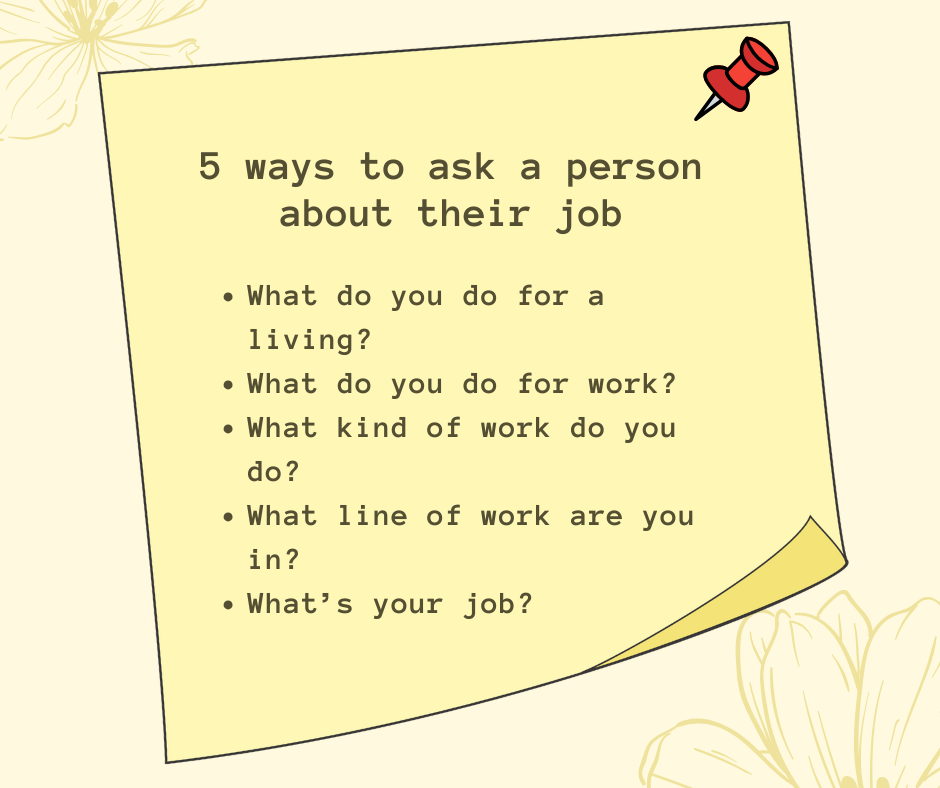Talking about your job is one of the most common small talk topics in English. Whether you’re introducing yourself at a party, talking to new friends or family members, or filling in a form, you’ll often need the right words to describe what you do.
In this post, you’ll learn useful phrases for explaining your job in English, plus train your ear for the common questions you could hear from other people. If you want to sound confident and know how to talk about your job in English naturally, this guide is for you.
Useful words and phrases
to make a living – to earn enough money to buy the things you need
- How does she make a living? – I think she has a part-time job or two.
- You can make a good living (= earn a lot of money) in sales if you are disciplined.
career – the jobs you have had in your life
- He’s hoping for a career in the police force.
- She’s had a very successful career in marketing.
occupation – your job or profession; the type of work you do
- Please fill in your name, age, and occupation.
- Parachuting is a dangerous occupation.
job (=position) – the work that someone does to earn money
- She got a job as a lab assistant.
- Once I get a residency permit, I can get a decent job.
Please note that they say ‘work as + a + position‘ when talking about a job, not ‘like’: She works as a tax advisor.
(to be) retired – when an older person has left his or her job and has usually stopped working completely
- I’m a 75-year-old retired teacher from Florida.
- Does he still work? I thought he was retired.
to be unemployed, out of work, between jobs – when someone does not have a job
- Have you been unemployed for over six months?
- I am out of work at the moment.
- I am afraid he is between jobs at the moment. It’s really hard to find a permanent position.
You may also find this video about phrases and collocations with the word ‘work’ useful.
to work part-time – to work for only part of each day or week
- I’m part-time. I work three days a week.
- She’s looking for a part-time job.
- A lot of mothers choose to work part-time.
How to ask a person about their job
There are a few ways to ask a person about their job.
Watch the video below to listen to examples of some common phrases taken from popular films (🇺🇸 movies) and TV series. This will help you understand these questions when people speak English fast.
Here is a list of the most common questions when asking about a person’s job.
- What do you do for a living?
- What do you do for work?
- What kind of work do you do?
- What line of work are you in?
- What’s your job? (sometimes may be considered rude)
You can also listen to these questions in audio format for additional practice (it’s usually harder to hear the speech without a picture).

How to talk about your job – useful phrases
So, how do you answer the questions above about yourself? Let’s have a look at some helpful standard formulas.
I am a + ‘position’
- I’m a teacher.
- I’m a shop assistant.
- I’m an entrepreneur (=businessman).
- I’m an artist.
- I’m a bartender.
- I’m an influencer. (=I have a big social media following and make money from that)
- I’m an engineer.
- I’m a freelancer. (=I get hired for projects by people or companies)
I am + ‘adjective’
- I’m retired. (=I don’t work anymore)
- I’m self-employed.
I am / work in + ‘field’
- I work in IT.
- I am in marketing.
- I work in sales.
- I work in online education.
- I am in finance.
- I’m in real estate.
I work in + ‘organisation’
- I work in a bank.
- I work in a school.
- I work in the Tax Office.
I work for + ‘company, business’
- I work for a publishing company.
- I work for a logistics company.
- I work for a Swiss law firm.
- I work for myself. (=I run a business)
—
Being able to talk about your job confidently will make everyday conversations in English much easier.
With these phrases, you can introduce yourself, ask others about their work, and respond naturally to such questions. Try practicing the phrases out loud and listen to how they are used in films, TV shows, or real-life conversations. The more you hear and use these expressions, the more natural you’ll sound.
👉 Now it’s your turn: write a short comment using some of the phrases from this post relevant to you and tell us about your job. It’s great practice!
If you like learning and practising English with me, consider supporting me by buying me a coffee:
You may also find useful
How to make arrangements in English | Free Quiz








